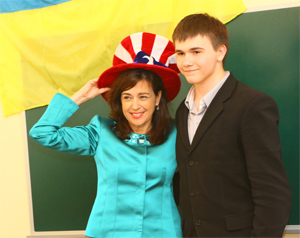Tara Sonenshine, the State Department's top public diplomacy and public affairs official, has stepped down after a 15-month tenure.
 Sonenshine with a Ukrainian student during an April appearance in Kyiv promoting the study of English through State Dept. programming. |
In a farewell letter, Sonenshine listed social media and digital outreach work, transformation of American spaces overseas, the creation of the Center for Strategic Counterterrorism Communications, and monitoring and evaluation of PD efforts among achievements during her tenure.
Sonenshine, in a speech last month, said the CSCC is highlighting "incendiary actions" by terrorist groups in Syria that are destabilizing the country and the region so that Syrians can "clearly see that we are not playing favorites and that the U.S. is fundamentally opposed to all forms of violent extremism and extreme sectarianism in that conflict."
Sonenshine, who joined State from the U.S. Institute of Peace, is headed to The George Washington University's School for Communications and Public Affairs in the fall, according to Foreign Policy.
Sonenshine was a reporter for ABC News and deputy director of the National Security Council during the Clinton administration. She took the State post from Obama's first public diplomacy czar, Judith McHale, the former Discovery Communications CEO, who did a two-year stint.
"In an ideal world, public diplomacy both 'sets the table' for policy and amplifies the policy through the connective tissue of real people," Sonenshine wrote this week.
Burson-Marsteller vice chairwoman Karen Hughes held the position during the last Bush administration, as did former ad exec Charlotte Beers.
Margot van Loon, a research associate at the American Foreign Policy Council in Washington, said in a U.S. News & World Report op-ed July 2 that vacancies in the top public diplomacy position have the U.S. government opportunities to wield its "soft power" over the past decade.
"This haphazard pattern has prevented the crafting of a coherent soft power strategy on the part of the U.S. government, much to America's detriment," wrote, van Loon, who argues the country's PD weakness has been exposed in the Snowden affair.



 Have a comment? Send it to
Have a comment? Send it to 
No comments have been submitted for this story yet.